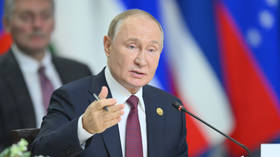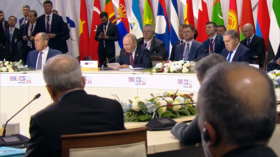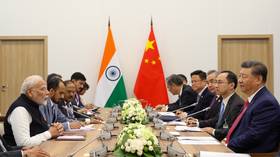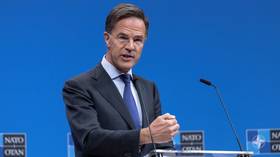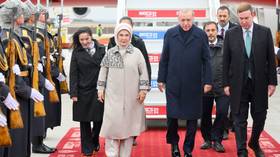America’s Irreplaceable Immigrants

Image by Tim Mossholder.
Every day when breakfast is served, Americans come face to face with the impact of immigrant workers without whom breakfast items would be too expensive for everyday consumption and/or if short on time, the nearest drive-through fast-food establishment, cars lined up for blocks, would charge an arm and a leg for a simple egg, cheese, and sausage sandwich. Without immigrant workers, costs will skyrocket beyond the reach of many Americans. And thankfully, undocumented immigrants are safer for US citizens than their own neighbors.
“A NIJ-funded study examining data from the Texas Department of Public Safety estimated the rate at which undocumented immigrants are arrested for committing crimes. The study found that undocumented immigrants are arrested at less than half (1/2) the rate of native-born U.S. citizens for violent and drug crimes and a quarter (1/4th) the rate of native-born citizens for property crimes.” (Source: Undocumented Immigrant Offending Rate Lower Than U.S.-Born Citizen Rate, National Institute of Justice, September 12, 2024)
“Substantial research has assessed the relationship between immigration and crime. Numerous studies show that immigration is not linked to higher levels of crime, but rather the opposite.” (Debunking the Myth of the ‘Migrant Crime Wave,’ Brennan Center for Justice, May 29, 2024)
In that regard, there’s been some chatter initiated by Texas Republican Rep. Tony Gonzales about 13,000 immigrants convicted of homicide. “A spokesman for the Department of Homeland Security said the data sent to Gonzales is being misinterpreted, and goes back four decades, long before the Biden administration.” (Source: More Than 13,000 Immigrants Convicted of Homicide Are Living Outside Immigration Detention in the U.S. ICE Says, NBC News, Sept. 28, 2024)
Immigrant laborers get their hands dirty when nobody else will. They are absolutely essential to the food supply chain, e.g., according to the Migration Policy Institute they are 30% of crop production workers across the country. In some instances, their numbers dictate survival of a basic food industry.
Some food production enterprises will cease to function without immigrant workers, e.g., 64% if Nebraska’s meat processing workers are immigrants. No immigrants, no steaks.
“Foreign workers make up about 68% of the workforce on American hog farms. Immigration is a key part of pork production, and many producers rely on foreign labor because it’s difficult to find a local workforce.” (Source: Immigration in the Swine Industry: Hiring Foreign -Born Labor, Pork Information Gateway). Moreover, immigrants make up 40% of the overall meatpacking workforce. No immigrants, no pork.
California supplies 33% of America’s vegetables and 75% of America’s fruit and nuts via a workforce dominated 65% by immigrants. They are at the core of the food supply chain to America. Additionally, California is America’s 4th largest beef producer, and the state is America’s dairy leader. Immigrants do 2/3rd of California’s agricultural work, supplying America’s all-important food chain. Without immigrants, breakfast costs will skyrocket beyond the reach of everyday Americans. Food inflation will eat America alive.
Iowa is one of America’s top pork and corn producers. A recent article in Bleeding Heartland, an independent website about Iowa politics, entitled Anti-Immigration Plans Could Have Unintended Consequences for Iowa AG d/d August 29, 2024: A major cattle producer in Sioux County claims: “If all of Sioux County’s immigrant labor left tomorrow, we’d have a huge problem. … We don’t have the people to replace them.” Moreover, according to the article: “It is not simply a matter of replacing immigrant labor with workers born in the United States. It is difficult finding people who want to do the backbreaking work of mucking out manure, hauling bedding for the animals, and moving thousands of pounds of feed for them every day.” No immigrants, no beef.
Bleeding Heartland’s article followed on the heels of a reversal of mean-spirited, lowbrow legislation: “In a victory for immigrant communities and families, on June 17 a federal district court in Iowa issued a preliminary injunction to block SF 2340, one of the worst, most far-reaching immigration laws ever passed in the state of Iowa.” According to Emma Winger, deputy legal director, American Immigration Council: “Sadly, we are still seeing copycat laws and proposed measures that would cause irreparable harm for immigrant families, including in Arizona, Texas, and Oklahoma. These types of laws create absolute chaos and human suffering and have no place in our legal system.” (Source: Iowa Blocks Hateful Anti-Immigrant Law, American Immigration Council, June 17, 2024)
And beyond the basic necessities of food supply, industry increasingly relies upon migrant workers. For example, in Ohio: Unions, Businesses Eye Migrants to Fill Labor Gaps in Ohio Reuters, May 2, 2024: “Help accessing immigrant communities to find workers to hire has been among the top three requests the Columbus Chamber of Commerce has fielded from local businesses in recent years, said Kelly Fuller, the chamber’s vice president of talent and workforce development.”
In the U.S., the expansion of the labor force via immigrants has kept the economy growing and consumer spending up without driving inflation even higher. According to Brookings Institution economist Tara Watson: “Immigration is bolstering a U. S. workforce that would otherwise be set to decline as the baby boomer generation retires. And especially in some fields, we have long-run structural needs that Americans are just not going to fill,’ Watson said, pointing to a lack of home health aides and other direct care workers,” Ibid.
In Charleroi, Pennsylvania David Barbe of Fourth Street Foods claims: “We operate 26 production lines for sandwiches, dinner, and breakfast bowls.” Out of 1,000 employees, 700 are immigrants on the assembly line. “The hours are long and monotonous, and Barbe says he gets almost no local applicants.” (Source: Charleroi, Pennsylvania, Business Owner Says Immigrant Population Works Jobs Americans Do Not Want, CBS News, September 18, 2024)
Pennsylvania thrives on newfound immigrants: “It is hard to overstate the importance of entrepreneurship since new businesses are the main driver of job growth in the United States. Immigrants play a particularly important role in this—founding businesses at far higher rates than the U.S. population overall. Today, millions of American workers are employed at immigrant-founded and immigrant-owned companies.” Pennsylvania claims 70,200 immigrant entrepreneurs paying $13 billion in taxes with $4.4 billion paid to social security and 650,200 total immigrant workers in the labor force. (Source: Immigrants in Pennsylvania, American Immigration Council)
Immigrants may be a political football that is easy to kick around but ironically, America’s biggest risk of becoming a third world country is loss of immigrant labor, resulting in grocery store shelves become increasingly empty, restaurants using paper plates/plastic forks to replace migrant help, and local farmer’s markets experiencing vicious, sometimes deadly, street fights by local citizens over scarce precious food items.
America’s Economic Growth Depends Upon Immigrants
“Immigrant workers are responsible for 88% of labor force growth in America since 2019.” (Source: Immigrants Will Be America’s Only Source Of Labor Force Growth, Forbes, October 16, 2024).
Labor force growth is crucial to economic growth, raising living standards for all citizens. According to the Dallas Fed: “While technological advances and incentives for investment will contribute to productivity growth, immigration will be vital to propping up labor force growth… The United States would have experienced no labor force growth during the past five years without immigrants and their children. Between 2018 and 2024, the number of workers with U.S. parents declined by 1.3 million, while the number of immigrants and children of immigrants in the U.S. labor force grew by 5.4 million,” Ibid.
America’s colleges and universities hold a special status in the eyes of the world: “Immigrant-origin students are the fastest growing group of students in higher education, driving over 90 percent of the domestic enrollment growth at U.S. colleges and universities from 2000 to 2022.” (Source: Immigrant-Origin Students in U.S. Higher Education – September 2024, Higher Ed Immigration Portal, Oct. 1, 2024)
Immigrants have never been more important to America’s growth and future. Immigrant labor does the backbreaking work that regular Americans refuse, the backbone of America’s food chain and industrial assembly lines. They do hard work in a quiet reserved manner. They are irreplaceable and the single most crucial factor to America’s future economic growth, which would stagnate without their resourcefulness and dedication to hard work.
